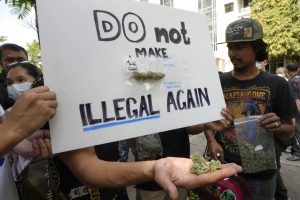[ad_1]

Hashish supporters maintain items of hashish whereas gathering outdoors the Authorities Home in Bangkok, Thailand, Tuesday, November 22, 2022.
Credit score: AP Photograph/Sakchai Lalit
Again in June, when Thailand grew to become the primary nation in Southeast Asia to legalize marijuana, legalization advocates celebrated the transfer as a step ahead for private freedom – and a uncommon glimmer of rationality in a area recognized for its draconian drug legal guidelines. However 5 months later, they’ve taken to the streets to protest a rising push by conservatives to re-list hashish as a narcotic.
On Tuesday, round 200 protesters, some sporting T-shirts emblazoned with marijuana leaf motifs, rallied at Authorities Home in Bangkok to protest the doable rollback of the drug’s current decriminalization. As The Related Press reported, “Tuesday’s rally introduced collectively hashish farmers and store homeowners who stand to lose out financially, in addition to people who smoke who wish to take pleasure in marijuana with out harassment.”
“There’s a very excessive probability that hashish could find yourself being unlawful once more, so it’s fairly a really excessive stake proper now,” Chokwan Chopaka of the Folks’s Community for Hashish Laws in Thailand, which organized the occasion, told Voice of America.
Earlier this yr, Thailand eliminated hashish from its listing of Class 5 narcotics, which additionally consists of opium, and in June, it grew to become the primary nation in Southeast Asia to legalize the drug’s cultivation for medical and culinary makes use of. However the step, which was spearheaded by Public Well being Minister Anutin Charnvirakul, was taken with out putting in a regulation to control the usage of hashish – particularly, the situations round its cultivation and sale.
On this vacuum of regulation has emerged a booming leisure marijuana trade. Throughout the nation, a whole bunch of hashish outlets have sprung up, together with cellular dispensaries and avenue stalls, promoting myriad strains of marijuana, in addition to pre-rolled joints and weed-infused gummies.
As VICE Information noted in an article final month, the liberalization, which coincided with Thailand’s post-COVID-19 financial opening and the return of worldwide tourism, “has seen hashish companies sprout throughout the nation, keen to hitch the inexperienced rush.”
The sudden proliferation of such companies, the obvious (although probably exaggerated) growth in marijuana use amongst youngsters, and breathless media stories about younger folks being hospitalized after consuming marijuana edibles, have sparked a backlash from some conservatives. Many at the moment are calling for harder restrictions – even for marijuana to be reinstalled on the listing of banned narcotics.
In a transfer to ease the strain, the authorities have launched a number of piecemeal laws clarifying that hashish can’t be offered to kids or close to faculties and temples and setting strict limits on how a lot THC – the plant’s energetic ingredient – that meals and medicines can comprise. A extra complete Hashish Management Invoice that may govern the cultivation, sale, and consumption of marijuana was additionally tabled in parliament yesterday, although the dearth of a quorum prevented any debate on the regulation.
However the laws isn’t sure to go, with opposition events, and even some officers from inside Prime Minister Prayut Chan-o-cha’s ruling coalition, arguing that hashish must be positioned again on the listing of scheduled narcotics till a extra sturdy authorized framework is established.
On November 21, the AP reported, Thailand’s Administrative Courtroom accepted a lawsuit filed by a physician and opposition lawmakers in opposition to Anutin and the Narcotics Management Board, which is searching for to reverse Anutin’s unique order and to successfully recriminalize marijuana. “It was flawed to not have governing legal guidelines earlier than unlocking hashish … it’s not getting used medically, however recreationally,” Smith Srisont, the president of Thailand’s affiliation of forensic physicians, informed reporters, according to Reuters.
The present stand-off illustrates the division between the nation’s leisure marijuana customers and pro-legalization advocates and Anutin, the person who did essentially the most to legalize the drug. A member of the Bhumjaithai Social gathering, which is a part of Prime Minister Prayut’s ruling coalition, Anutin’s agenda was much less to legalize the leisure use of marijuana than to advertise the plant’s medicinal use and to generate a industrial trade round serving this medical demand. Farmers are an vital constituency for the Bhumjaithai Social gathering, whose help it hopes to domesticate (so to talk) forward of elections due subsequent yr.
Whereas Anutin has defended his coverage and dominated out recriminalizing marijuana, there’s a probability that neither he nor his occasion will probably be ready to make these selections after the nation’s subsequent election, resulting from be held by Could 2023. Given the vocal opposition, and the ham-fisted method wherein that liberalization has proceeded up to now, Thailand’s pioneering push may properly find yourself being a false daybreak for Asian drug liberalization.
[ad_2]
Source link

